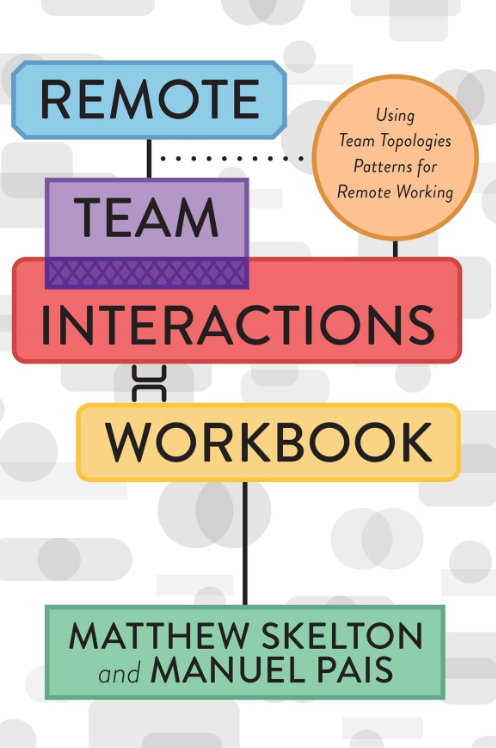Laguna Saturday, July 09, 2022
Remote Team Interactions Workbook Review

If you have been somewhere close to software development in the early 2020s, there is no way around the seminal book "Team Topologies". The widely acclaimed book was released in 2019 and describes how to organize teams in a software corporation. While it has an astonishing amount of 1322 ratings on Amazon, there is the 2021 "Remote Team Interactions Workbook" by the same authors, which only has 40 reviews so far.
One more reason to give it a more detailed look. With 63 pages it is rather short and based heavily on "Team Topologies". While you can read it without knowing its big brother, doing so definitely is a big plus.
Content
The book's content is all about the new remote-first working mode, made necessary by the Covid lockdowns, that were imposed in most countries in 2020. The lockdowns radically changed the way of working for many people, especially in the software industry. A switch from working completely in the office to fully remotely was performed during just a few days.
It is in fact a workbook. While it shortly introduces the concepts and ideas, it does not go into full detail on them. There is rather a quite extended reference list - and just from reading 60 pages I got three new books on my wishlist. The focus is on implementing the concepts discussed. There are extensive examples as well as (online) material for you to fill out for your team, accomodated by a "now your turn" section, explaining the steps in detail.
While a lot of the topics are focused on remote-first activities, most of them are generally valid. To name just some of the topics:
- Team APIs: How does a team interface to other teams? This includes description of artifacts, versioning, communication preferences.
- Dependency tracking: Which teams depend on which other teams? Which dependencies are blocking, which can be accepted? How long-lived are the dependencies?
- Team boundaries: How big should teams be? How to organize the communication between teams, especially with messenger tools, like Zoom, Teams, Slack, and others.
Summary
For "Team Topologies" I was quite unsure in the beginning how much I would like the book. hint: after a few chapters I was really hooked, because there is an abundance of concepts where I realized "Wow, this is generally helpful, I have not thought about it in this specific way!". For "Remote Team Interactions Workbook" I was immediately hooked on page one by this beautiful comment:
"While some companies have embraced this new reality [covid lockdowns] - ditching their downtown offices and telling staff they can work from home permanently - many other organizations are discovering for the first time that the physical office was covering up poorly defined teams and poorly defined areas of focus, threatening their DevOps transformation efforts and the overall health and success of their business."